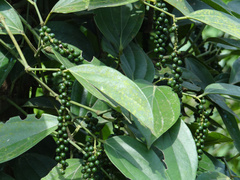Manuals for more biodiversity in spice cultivation
In India, spices are cultivated in important biodiversity hotspots. However, changes in cultivation practices endanger both the productive base and biodiversity. Two new manuals for drawing up ‘Biodiversity Action Plans’ now provide support for spice producers.
The Western Ghats, a mountain range in southwest India, is one of the world’s most important biodiversity hotspots. It is also one of the main growing areas for spices such as pepper, cardamom, nutmeg and cinnamon. Spices are an essential livelihood for millions of smallholders in India. However, changes in cultivation methods endanger the productive base, eventually leading to the destruction of biodiversity and the environment.
This is where the project, ‘Private Business Action for Biodiversity’ comes into its own – in cooperation with the Global Nature Fund, the project has developed guidelines for drawing up ‘Biodiversity Action Plans’, which enable producers to plan better and to implement measures to protect biodiversity in and around the production areas. This preserves ecosystem services that form an important basis for the production of spices such as fertile soils, clean water, pollination and climate regulation. The guidelines also serve as a basis for the integration of biodiversity-friendly measures for companies and standards.
“Companies can use these action plans to improve the sustainability of their supply chains and communicate their actions and results more clearly for the protection of people and biodiversity” says Rik Kutsch Lojenga, Director of the Union for Ethical Biotrade (UEBT) and an expert on the ethical sourcing of ingredients based on biodiversity.
In addition to developing guidelines for the spice sector, the project also trains advisors of Indian companies and standard organisations on how to draw up biodiversity action plans and accompanies pilot applications on site. The project works closely with the Global Nature Fund, Rainforest Alliance, the Union for Ethical Biotrade (UEBT) and Indian partner organisations such as the All India Spices Exporters Forum, PDS Spices and the Spice Board of India.
The project ‘Private Business Action for Biodiversity’ is commissioned by the German Federal Ministry for the Environment, Nature Conservation and Nuclear Safety (BMU) and implemented by the Deutsche Gesellschaft für Internationale Zusammenarbeit (GIZ). It is part of the International Climate Initiative (IKI).
Manuals with guidelines on how to prepare biodiversity action plans for the typical spices of the Western Ghats (pepper, cardamom, nutmeg and cinnamon) and chilli are now available for download:
Manual on Biodiversity Action Plan for Chili Production
Manual on Biodiversity Action Plan for Pepper, Cinnamon, Cardamon and Nutmeg

